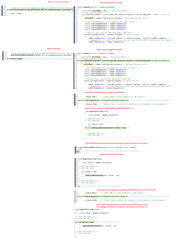Other Parts Discussed in Thread: HALCOGEN
Hi Team
Hope you are doing good.
I have a very strange problem which i m not able to solve. I would be very grateful to you if you could please help me solving the same quickly as it is really very urgent for the project.
I have implemented a SPI slave DMA interrupt on RM44L520.
Everytime the master sends the data, the interrupt is triggered which is what i expected.
The problem is... when the master is not sending any data, the slave is stuck at following statement and never exits from here. i am clueless why is this happening.
(*pf_irqFunc)(); /* Execute interrupt routine */
This statement is part of following function
void irqHandler(uint32_t u32VectorIrqIndex)
{
t_isrFuncPTR pf_irqFunc = NULL; /* Assign Null address */
/* Check IrqVector Range */
if ((u32VectorIrqIndex > (uint32_t)0U) && (u32VectorIrqIndex <= U32_VIM_CHAN_MAX) /* index is valid */)
{
pf_irqFunc = vimRAM->ISR[u32VectorIrqIndex]; /* Read IRQ Interrupt Vector */
/* Save VIM REQENASET[0,1,2,3] Registers for later restore */
uint32 u32BckupREQMASKSET0 = vimREG->REQMASKSET0;
uint32 u32BckupREQMASKSET1 = vimREG->REQMASKSET1;
uint32 u32BckupREQMASKSET2 = vimREG->REQMASKSET2;
uint32 u32BckupREQMASKSET3 = vimREG->REQMASKSET3;
/* Mask out lower priority IRQs depending on IRQ index */
if(U32_VIM_CHAN3_OFFSET < u32VectorIrqIndex) /* Channel 97-127*/
{
vimREG->REQMASKCLR3 = ((U32_REG_CLRMASK << (u32VectorIrqIndex - 97U)) & (~vimREG->FIRQPR3));
/* Readback Mask to ensure that the previous write was finished before enabling interrupts again */
vimREG->REQMASKCLR3 = vimREG->REQMASKCLR3;
}
else if (U32_VIM_CHAN2_OFFSET < u32VectorIrqIndex) /* Channel 64-96 */
{
vimREG->REQMASKCLR2 = ((U32_REG_CLRMASK << (U32_CHAN_REG2_OFFSET(u32VectorIrqIndex))) & (~vimREG->FIRQPR2));
vimREG->REQMASKCLR3 = ( U32_REG_CLRMASK & (~vimREG->FIRQPR3));
/* Readback Mask to ensure that the previous write was finished before enabling interrupts again */
vimREG->REQMASKCLR3 = vimREG->REQMASKCLR3;
vimREG->REQMASKCLR2 = vimREG->REQMASKCLR2;
}
else if (U32_VIM_CHAN1_OFFSET < u32VectorIrqIndex) /* Channel 32-63 */
{
vimREG->REQMASKCLR1 = ((U32_REG_CLRMASK << (U32_CHAN_REG1_OFFSET(u32VectorIrqIndex))) & (~vimREG->FIRQPR1));
vimREG->REQMASKCLR2 = ( U32_REG_CLRMASK & (~vimREG->FIRQPR2));
vimREG->REQMASKCLR3 = ( U32_REG_CLRMASK & (~vimREG->FIRQPR3));
/* Readback Mask to ensure that the previous write was finished before enabling interrupts again */
vimREG->REQMASKCLR3 = vimREG->REQMASKCLR3;
vimREG->REQMASKCLR2 = vimREG->REQMASKCLR2;
}
else if (U32_VIM_CHAN0_OFFSET < u32VectorIrqIndex) /* Channel 2-31 */
{
vimREG->REQMASKCLR0 = ((U32_REG_CLRMASK << (U32_CHAN_REG0_OFFSET(u32VectorIrqIndex))) & (~vimREG->FIRQPR0));
vimREG->REQMASKCLR1 = ( U32_REG_CLRMASK & (~vimREG->FIRQPR1));
vimREG->REQMASKCLR2 = ( U32_REG_CLRMASK & (~vimREG->FIRQPR2));
vimREG->REQMASKCLR3 = ( U32_REG_CLRMASK & (~vimREG->FIRQPR3));
/* Readback Mask to ensure that the previous write was finished before enabling interrupts again */
vimREG->REQMASKCLR3 = vimREG->REQMASKCLR3;
vimREG->REQMASKCLR2 = vimREG->REQMASKCLR2;
}
else /* FIQ is not executed in this context*/
{
ErrHdl_vSetErrCodeDummy; /* Reaction Safe Mode */
}
_enable_IRQ(); /* Enable IRQ, to allow preemption of IRQ routine */
(*pf_irqFunc)(); /* Execute interrupt routine */
_disable_IRQ(); /* Disable IRQ, to protect the remainder of the dispatcher from preemption */
/* Restore VIM REQENASET[0,1,2,3] Registers */
vimREG->REQMASKSET0 = u32BckupREQMASKSET0;
vimREG->REQMASKSET1 = u32BckupREQMASKSET1;
vimREG->REQMASKSET2 = u32BckupREQMASKSET2;
vimREG->REQMASKSET3 = u32BckupREQMASKSET3;
}
else /*index is not valid */
{
ErrHdl_vSetErrCodeDummy; /* Reaction Safe Mode */
}
}
and the function pointer itself points to..
/* SourceId : DMA_SourceId_019 */
/* DesignId : DMA_DesignId_016 */
/* Requirements: HL_SR181, HL_SR182 */
void dmaBTCAInterrupt(void)
{
uint32 offset = dmaREG->BTCAOFFSET;
/* USER CODE BEGIN (6) */
/* USER CODE END */
if (offset != 0U)
{
dmaGroupANotification(BTC, offset - 1U);
}
/* USER CODE BEGIN (7) */
/* USER CODE END */
}
Kindly let me know if you need any other information on this.
Thank you and have a lovely day..


